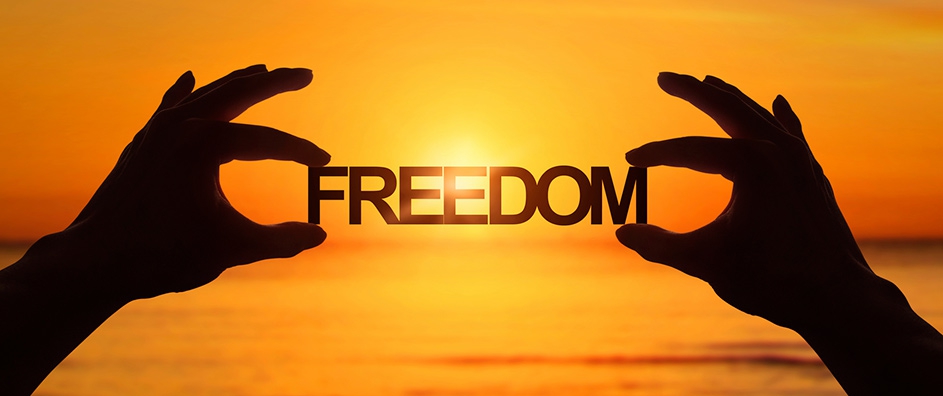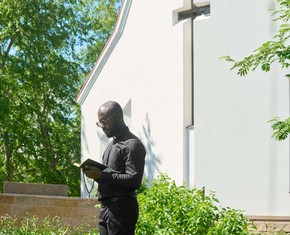The views expressed in our content reflect individual perspectives and do not represent the authoritative views of the Baha'i Faith.
The fourth is freedom from fear, which, translated into world terms, means a worldwide reduction of armaments to such a point and in such a thorough fashion that no nation will be in a position to commit an act of physical aggression against any neighbor—anywhere in the world. – President Franklin Delano Roosevelt, from his Four Freedoms speech, January 6, 1941.
Whereas recognition of the inherent dignity and of the equal and inalienable rights of all members of the human family is the foundation of freedom, justice and peace in the world,
Whereas disregard and contempt for human rights have resulted in barbarous acts which have outraged the conscience of mankind, and the advent of a world in which human beings shall enjoy freedom of speech and belief and freedom from fear and want has been proclaimed as the highest aspiration of the common people… – from the Preamble of the Universal Declaration of Human Rights.
For you have been and are now living in freedom, and you have no fear of anybody. Is there a greater blessing than this? Freedom! Liberty! Security! These are the great bestowals of God. – Abdu’l-Baha, The Promulgation of Universal Peace, p. 52.
Someone once asked me: “Is there a Baha’i Bill of Rights?”
If I had to summarize a Baha’i bill of rights in one sentence, I’d paraphrase an early Baha’i thinker and writer named Stanwood Cobb, who said that the Baha’i Faith brings us a whole array of new human rights: the right to live in a united global society, the right to thrive as a spiritual being and not a mere physical and economic producer and consumer, the right to be free of prejudice and racism, the right to education and equal opportunities, the right to worship God through creative work, the right to the means of physical health and human necessities, the right to develop spiritual capacities without the corrosion of ruthless competition or arbitrary authority, and maybe most important, the right to spiritual self-knowledge that can eliminate useless frustration, anxiety and fear.
We all have the right, the Baha’i teachings say, to free ourselves from fear. But how do we get there?
The Baha’i teachings advocate an end to violence and aggression, both inter-personal and international. They call for universal education, a true system of criminal justice and the reduction of armies and armaments to accomplish that peaceable goal.
The Baha’i teachings advocate worldwide cooperation and unity, reducing and finally eliminating the national and regional conflicts that lead to war.
The Baha’i teachings advocate universal democratic systems of global governance, giving everyone on Earth freedom from tyranny and a voice in their own destiny.
The Baha’i teachings advocate the adoption of a universal auxiliary language, to do away with the fearfulness and foreignness that comes with being unable to communicate with one another.
The Baha’i teachings advocate the elimination of personal and institutional prejudice and racism, to remove the fears that separate people of differing colors, ethnicities and national origins.
The Baha’i teachings advocate the equality of men and women, to erase the long-lasting gender-based injustices that have held the world back from its potential progress.
The Baha’i teachings advocate for unity—unity of the races, the religions and the nations.
Ultimately, the Baha’i teachings say, those essential rights will free us from the fears that have plagued human society since its inception:
Praise be to God, Baha’u’llah hath lifted the chains from off the necks of humankind, and hath set man free from all that trammelled him, and told him: Ye are the fruits of one tree and the leaves of one branch; be ye compassionate and kind to all the human race. Deal ye with strangers the same as with friends, cherish ye others just as ye would your own. See foes as friends; see demons as angels; give to the tyrant the same great love ye show the loyal and true, and even as gazelles… offer up sweet musk to the ravening wolf. Be ye a refuge to the fearful; bring ye rest and peace to the disturbed; make ye a provision for the destitute; be a treasury of riches for the poor; be a healing medicine for those who suffer pain; be ye doctor and nurse to the ailing; promote ye friendship, and honour, and conciliation, and devotion to God, in this world of non-existence. – Abdu’l-Baha, Selections from the Writings of Abdu’l-Baha, p. 71.
Next: The Fear of Nuclear Annihilation
















Comments
Sign in or create an account
Continue with Googleor